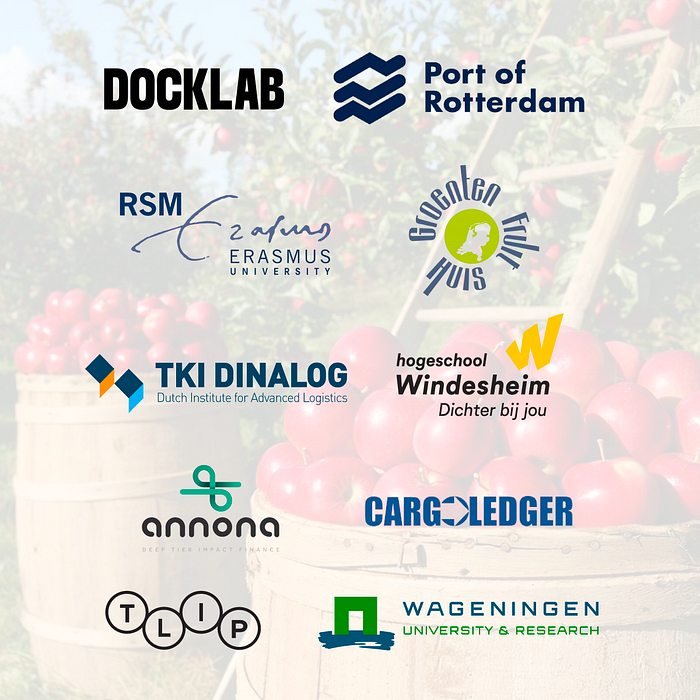TLIP Joins RESULD: Digitising Global Fruit and Vegetable Supply Chains
We are delighted to announce that TLIP will participate in RESULD (Responsible Supply Chains and Logistics Due Diligence).
RESULD aims to tackle barriers in global trade that stem from paper-based cross-border processes. It will do so by digitising end-to-end fruit and vegetable supply chains between Kenya, the Netherlands, and the United Kingdom.
When interruptions occur in the transportation of fruits and vegetables, it leads to a series of additional expenses, such as hiring extra labour to repackage and salvage the products, as well as fines, charges, and penalties levied by distributors. Moreover, fresh fruits and vegetables, owing to their short shelf life and the necessity for refrigeration, are particularly susceptible to product loss when supply chain disruptions occur. As a 2023 report by the Global Coalition of Fresh Produce states, “This situation is exacerbated by a lack of digital integration among the various actors in the supply chain, including carriers, port authorities, port services providers, trucking and railroad firms, warehousing and forwarding firms, importers and exporters. This lack of communication leads to compounded delays and increased costs.”
By improving fruit and vegetable trade through digitisation, RESULD aims to enhance product quality and uphold ESG standards through regulated and self-imposed measures within these supply chains. This is where TLIP steps in, serving as a comprehensive data pipeline for trade consignments in the project.
About RESULD
RESULD is led by a consortium headed by the Rotterdam School of Management and Docklab, a technology lab and venture studio based in the Port of Rotterdam. They have recently been awarded almost half a million dollars to execute the project by TKI-Dinalog, the Dutch Institute for Advanced Logistics.
The consortium also features the Port of Rotterdam, GroentenFruit Huis (Fresh Produce Centre), CargoLedger, Annona, Wageningen University & Research, and Windesheim University of Applied Science.

TLIP Connecting Supply Chain Stakeholders
The integration of TLIP enables RESULD to support seamless collaboration between the systems of the various actors involved in the supply chains. For example, in one use case, TLIP helps connect all actors of a trade consignment supply chain across Kenya and the UK by serving as the backbone of an end-to-end data pipeline.
With ambitious goals to streamline cross-border processes, TLIP offers great potential for enhancing efficiency and reducing trade barriers. For example, TLIP enables data exchange directly from the source, ensuring seamless sharing with all relevant stakeholders. Furthermore, by being built on the IOTA digital ledger technology, TLIP offers RESULD benefits such as immutable records and comprehensive traceability that are key for a digital end-to-end supply chain.
As Aljiosa Beije, Chief Technical Officer of Docklab, explains: “TLIP is a key component of RESULD’s vision of a truly digital end-to-end supply chain solution. Not only from a technical perspective but also in terms of its ecosystem.”
Learning from Past Projects to Ensure Future Success
RESULD draws on the insights gained from several previous digitalisation initiatives.
- Two initiatives by TKI-Dinalog: Spark! Living Lab, an initiative focused on data sharing technologies in supply chain and logistics, including digital bills of lading ownership transfers and innovative digital supply chain twin solutions; and GEDAC (Government Digitization to Enhance Agro-food Chains), a project aiming to digitise certificates such as the phytosanitary certificate in international agro and food chains.
- Ecosystem of Trust pilots conducted by a consortium led by the UK Institute of Export & International Trade. In these pilots. TLIP was tested as a data-sharing infrastructure for trade consignments (coffee, tea, flowers, frozen fish, and canned food) between the UK, Kenya, and the EU.
- Other groundbreaking Dutch and European research projects such as QuayConnect, an initiative that automates the flow of documents and information in customs clearance processes.
Moreover, RESULD will identify four new use cases to fast-track the transition to digitalised processes during the course of the project.
A Project Tailored to Current Demands and Progress
The timing for RESULD is perfectly aligned with the new developments and needs of the global trade landscape.
The digital exchange of trade data between systems is still at an early stage. Despite advancements in internal digital systems, external data exchange often resorts to paper-based documents like PDFs due to interoperability gaps.
However, there is evidence of development. A study by the OECD shows that digital connectivity reduces global trade costs, with a 1% increase in digital connectivity leading to a 0.1% reduction in costs. Moreover, the same study suggests that the impact of digital connectivity on international trade costs is increasing significantly with time, having tripled from 1995 to 2018.
Furthermore, legislation is advancing digitalisation. For example, the UK’s Electronic Trade Documents Act from September 2023 permits digital transfer of ownership of trade documents. By acknowledging electronic trade documents as equivalent to paper ones, the Act opens up avenues for innovation, especially in sustainability. The Carbon Border Adjustment Mechanism (CBAM), initiated in 2023, obliges companies importing into the EU to disclose and validate emissions in their supply chains. Compliance with ESG regulations is crucial not only for legal adherence but also to meet consumer demands for transparency and sustainability in product origins.
Source: TLIP
Be the first to comment




